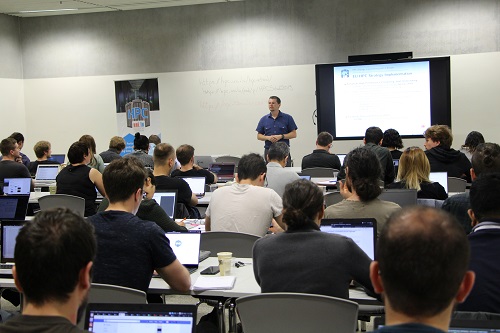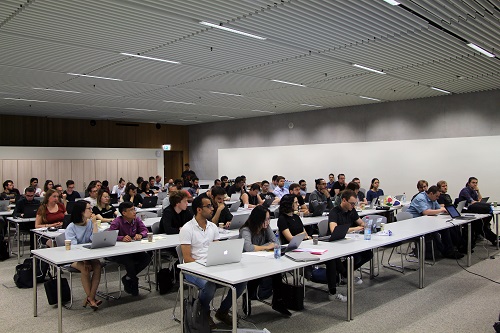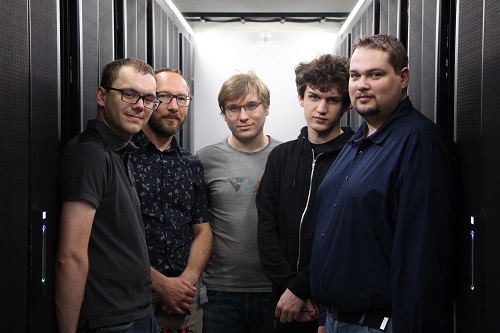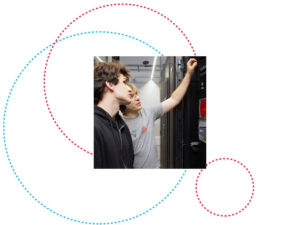On 20-21 June 2019, the 9th edition of the High Performance Computing (HPC) School gathered more than 100 participants in Belval. On this occasion, the HPC team lead by Prof. Pascal Bouvry and Dr. Sebastien Varrette welcomed Filip Kučerák, winner of the Computational Science Award at the European Union Contest for Young Scientists (EUCYS) 2018.

The HPC School 2019 event was again the opportunity to offer for both beginners and advanced users an up-to-date overview of the High Performance Computing (HPC) developments recently performed within the University of Luxembourg and abroad, as well as instructions and practical sessions on a variety of topics representative of research activities and domains present at the university that benefit from HPC.
The traditional inaugural keynote presented by Dr. Sébastien Varrette offered an up-to-date overview of the Meluxina within the University but also at the national and European level, especially with regards the definition of a HPC and Big Data strategic developments and the official announcement of the National HPC Competence Center supercomputer in Luxembourg.

A second keynote delivered the second day by researcher Sarah Peter covered the Iris Cluster which is of particular importance with the release of thedata management aspects and the incoming decommissioning of the old HPC facilities enforcing the migration of data and computational workflows toward the current flagship production system, named GDPR regulation.
Otherwise, most of the time was dedicated to 18 practical parallel sessions lectured by the HPC team together with leading computational scientists of the University of Luxembourg and HPC technologists, namely Dr. Varrette, Valentin Plugaru, Sarah Peter, Hyacinthe Cartiaux, Clément Parisot, Dr. Frederic Pinel, Dr. Emmanuel Kieffer, Dr. Xavier Besseron and Dr. Aurélien Ginolhac.
These sessions covered a wide range of topics, such as:
- Access to and interaction with the HPC infrastructures
- HPC workflow management, including monitoring and performance engineering profiling
- HPC programming and usage of the main software available on the platform, with dedicated sessions directed towards Scalable Science
- MATLAB/Mathematica, R, Python, Big Data analytics, Bioinformatic workflows, Deep and Machine learning, Mixed-Integer Programming (MIP) optimization with CPLEX and Gurobi
- Virtualisation with Singularity containers on the clusters

In all cases, questions and exchanges were fruitful during this new edition. The user session proposed on the second day was also well appreciated, as it presented research outcomes as well as HPC aspects from some of the platform’s users, covering a broad range of domains:
- Bio-informatics, with a talk entitled “Exploratory analysis of ATAC-seq data from dopaminergic neurons” by Nikola Maria De Lange
- Distributed Ledgers, with a presentation of “RepuCoin: Reputation-based Byzantine consensus” by Dr. Jérémie Decouchant
- Computational Physics, with a talk on “High Performance Parallel Coupling of OpenFOAM and XDEM”, by Dr. Xavier Besseron

Finally, as indicated above, young Slovak Filip Kučerák used his prize to visit the University’s HPC facility and attended the two-day event as winner of the Computational Science Award for his project “Trevo: Trees as a results of an algorithm » during the European Union Contest for Young Scientists (EUCYS 2018) which took place in September 2018 in Dublin. This award is sponsored by the Partnership for Advanced Computing in Europe (PRACE) in which Luxembourg is represented by delegates and advisors from the University of Luxembourg since October 2017.
Presentations are available online: https://hpc.uni.lu/hpc-school/2019/06/index.html
The next edition of the HPC School is expected to take place in November 2019 in Belval.
